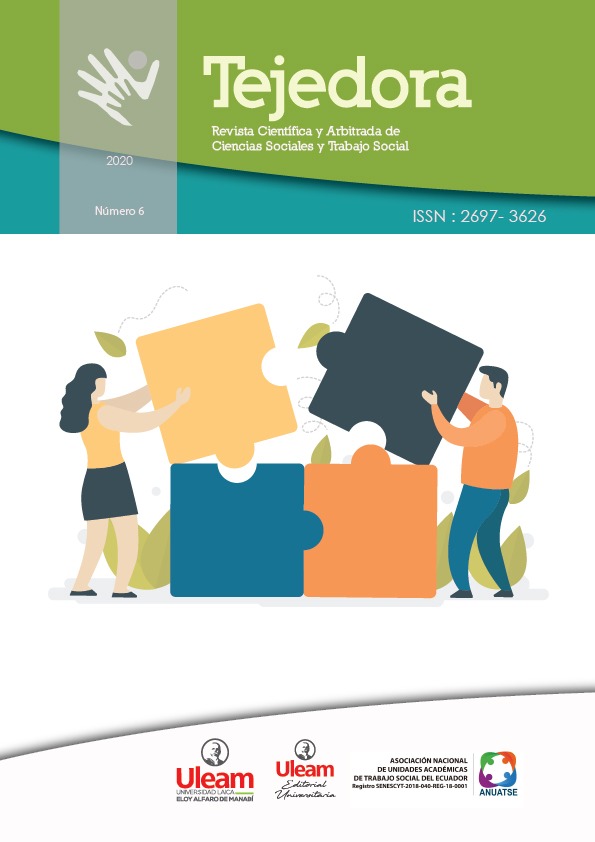SOCIAL FACTORS INFLUENCING BULLYING IN EIGHTH GRADE STUDENTS
DOI:
https://doi.org/10.56124/tj.v7i15ep.010Keywords:
School bullying, social factorsAbstract
The research is based on the need to understand the phenomenon of bullying and its implications on the well-being of students, considering that the objective was to identify the social factors that affect bullying in eighth grade students of the Heroes del Cenepa Municipal School of Loja during the first semester of 2024. A study was carried out in the aforementioned school, located in the province of Loja, Ecuador, between March and July 2024, using a methodology that included the application of an AVE questionnaire, which covered 50 items distributed in four areas: Harassment, Intimidation, Exclusion and Aggressiveness, as well as a survey to collect data on students' interpersonal relationships. The results revealed that 86% of the students report a good family coexistence, but only 36% feel accepted by their peers. In addition, 56% of the students experience name-calling, indicating a significant problem of verbal harassment, and although 68% of the students receive support from their peers, 10% do not feel supported. In conclusion, social factors, such as family coexistence and peer support, are determinants in the experience of bullying, and the high incidence of name-calling and the perception of social exclusion require the implementation of effective interventions to promote a safe and supportive school environment.
Downloads
References
Arredondo, E., Gómez, R., Lalama, R., & Chóez, L. (2020). Investigación científica y estadística para el análisis de datos. Dilemas Contemporáneos: Educación, Política y Valores. EBSCOhost. https://openurl.ebsco.com/contentitem/gcd:158168830?sid=ebsco:plink:crawler&id=ebsco:gcd:158168830
Flechas, C. (2022). Acoso escolar en América, la delgada línea entre la prevención y el crimen. SWI swissinfo.ch. https://www.swissinfo.ch/spa/acoso-escolar-en-américa-la-delgada-línea-entre-la-prevención-y-el-crimen/47702554
Esteban, A., Cruz, M., Aldana, M., Bueno, L., & Vega, E. (2020). Prevalencia y factores asociados con el acoso escolar en adolescentes. Revista Cuidarte, 11(3), Article 3. https://doi.org/10.15649/cuidarte.1000
Guzmán, V. (2021). El método cualitativo y su aporte a la investigación en las ciencias sociales. Gestionar: revista de empresa y gobierno, 1(4), Article 4. https://doi.org/10.35622/j.rg.2021.04.002
Masabanda, M. (2023). Acoso escolar y su relación con las habilidades sociales en adolescentes. https://repositorio.uta.edu.ec:8443/jspui/handle/123456789/38557
Ortiz, L., Cortes, M., & Larrans, S. (2022). Factores de acoso escolar o bullying en estudiantes del entorno educativo. https://hdl.handle.net/20.500.12494/47120
Pazmiño, M., & Gonzalez, I. (2022). Acoso escolar y su relación con las habilidades sociales en adolescentes. Ciencia Latina Revista Científica Multidisciplinar, 6(6), Article 6. https://doi.org/10.37811/cl_rcm.v6i6.4164
Ramírez, L. (2024). El impacto del acoso escolar en los adolescentes: Exploración de los factores de riesgo y estrategias de prevención efectivas [masterThesis, Ambato: Universidad Tecnològica Indoamèrica]. https://repositorio.uti.edu.ec//handle/123456789/6675
Silva, M.(2018). Tesis de Grado Situacion del Acoso Escolar en Estudiantes del Nivel Secundario de la Unidad Educativa “Don Bosco El Prado” de la Ciudad de la Paz.
Torrado, O., Beltrán, Y., & Vargas, C. (2016). Prevalencia del Hostigamiento Escolar en las Instituciones Públicas de Bucaramanga-Colombia. Sophia, 12(2), 173-186. https://doi.org/10.18634/sophiaj.12v.2i.233
Published
How to Cite
Issue
Section
License
Copyright (c) 2024 Revista Científica y Arbitrada de Ciencias Sociales y Trabajo Social: Tejedora. ISSN: 2697-3626

This work is licensed under a Creative Commons Attribution-NonCommercial-ShareAlike 4.0 International License.






















